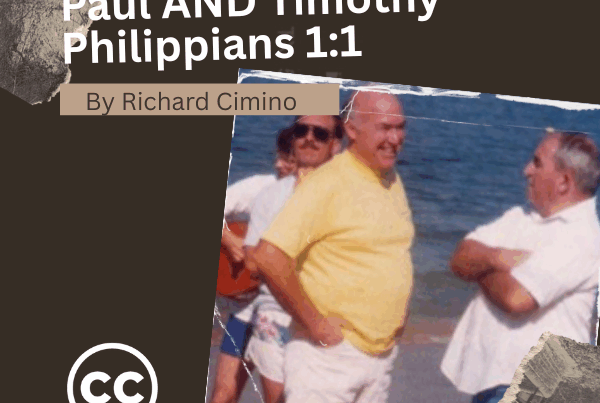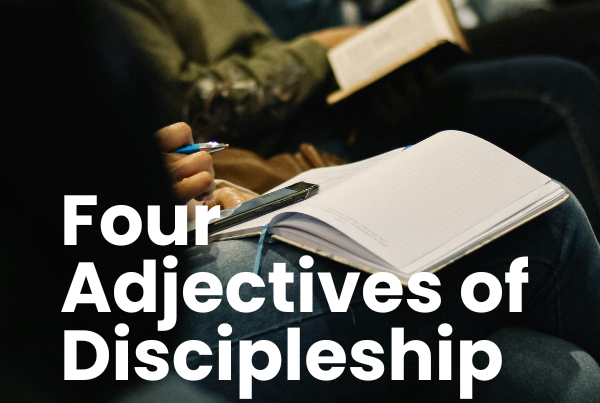
“You Lord are good, and ready to forgive” (Psalm 86:5). “Neither do I condemn you. Go and sin no more”(John 8:11).
The Bible has one dominant message: redemption.
All Biblical themes are wrapped around this. If we understand redemption, we understand the Bible. If however, we miss this truth, we will veer into jungles of strange, heretical thoughts about God, mankind and the meaning of life. And our favorite aspect of this redemption is wrapped up in one more word: forgiveness. Many theological terms need explanation. These don’t.
Forgiveness is the act of being released from debt, often, but not always including the escape from many of the consequences of our action. Redemption is the result of an exchange, the action of gaining or regaining possession of something by making payment, exchange or giving a ransom.
Every kid who ever collected “pop” bottles understands redemption. I remember one steamy, Ohio summer, searching both sides of the road near our rural house to find those discarded treasures. I cashed in 6.5 oz Coke bottles for two cents, but the mother load was a “family-size” RC bottle, which brought a whole nickel when the market owner bought it back from me, the finder. That “search-find-sell” game is redemption, the process whereby the discarded becomes the prized, that’s the message of Psalm 130. What do Coke bottles have to do with you and me? Everything! It comes down to redemption. “Out of the depths” we cry, and God not only hears but also forgives. This psalm is the song of the redeemed, and it’s no coincidence that it’s found without the name of an author.
Most assume David is the writer. We all know about David’s notorious failures and the deep sense of shame that gripped this “man after God’s own heart.” But couldn’t you or I have written this song? Haven’t we all been in the depths of sin, shame and brokenness? Haven’t we all been discarded like a “pop bottle,” lying empty and dirty in a gutter?
Haven’t we all wondered if we could ever be forgiven for our worst moments and our most devastating failures that we can’t even forgive ourselves for?
Whoever the writer of this comforting piece of poetry may be, he or she wants us to know that we can confidently approach God with our confession of sin and lay the burden of our shame before Him. We are told emphatically that even though nothing we do or say escapes God’s attention (a frightening realization), the more important truth is that God is not keeping files on us in order to build a case against us like a sleazy politician. Every election cycle, opponents gather nasty details about their “enemy” in order to drag out that incriminating evidence at the appropriate moment in the hope that the news of past failures will torpedo a campaign.
Political candidates may do that, but God is not pursuing public office. He is pursuing us, calling us, drawing us to Him. Not with endless reminders of our shabby behavior, but rather with the liberating truth that there is forgiveness and redemption with Him.
So, can I be forgiven for what I’ve done?
Look at the cross of Jesus. Can God fix the mess I’ve made of my life? Look at the cross. Does God seriously want to have a relationship with me? Look at the cross. The answer to all those soul-based questions is a resounding YES! YES! YES! The cross says it all.
And notice how verse five says, “…In His word I do hope.” That is a reminder that we don’t base our hope of forgiveness on a wish but on a WORD … God’s Word. If God has said He will forgive, then He will forgive. God is not passionate about keeping files on us. What God is passionate about is shredding files and folders filled with records of our evil deeds. He loves to restore, reinstate, renew and rebuild fallen, broken people. If there’s a process to redemption, it’s a simple one. Start where this singer starts. Recognize that God is ready to forgive. Come confidently to Him and say something like this:
Father in heaven, hear my voice, listen to my prayer. I’m guilty of sin. I’ve done shameful things. I’m sorry and ready to leave that all behind. Please forgive me. Thank you for sending Jesus Christ to die for my sins. I surrender what is left of me to You. Thank You for forgiving me.
If you have better words than that, use them, but speak your heart to God in the name of Jesus and receive that redemption Christ died for and then rose from the dead to give you. Then wait upon God. Settle into the calmness of verses five and six; “I’m waiting on You, Lord, I’m hoping in Your word, looking to you like those who watch for the beauty of the sunrise.” (my paraphrase)
God is ready to forgive you.
He said it. Believe it! Ask for it; receive it. Then live in and walk in that most wonderful fruit of forgiveness, His peace. God reminds us to “go public” with His truth. In verses seven and eight, the forgiven psalmist says to other guilty souls, “Hope in the Lord, for with the Lord there is mercy.”
So, tell the alcoholic, drug addict, murderer, rapist, adulterer, pimp, prostitute, homosexual, thief, liar and self-righteous Pharisee, “There is Forgiveness with God.” This is their psalm too. This is a psalm for every age, every soul, every generation. This is the song of the forgiven … the redeemed.
Stand in the solid place of redemption. Refuse to let anyone, including you, drag you back into the shame God has lifted. Revel and rejoice in the overflow of God’s “abundant redemption.” The files against you have been shredded.






